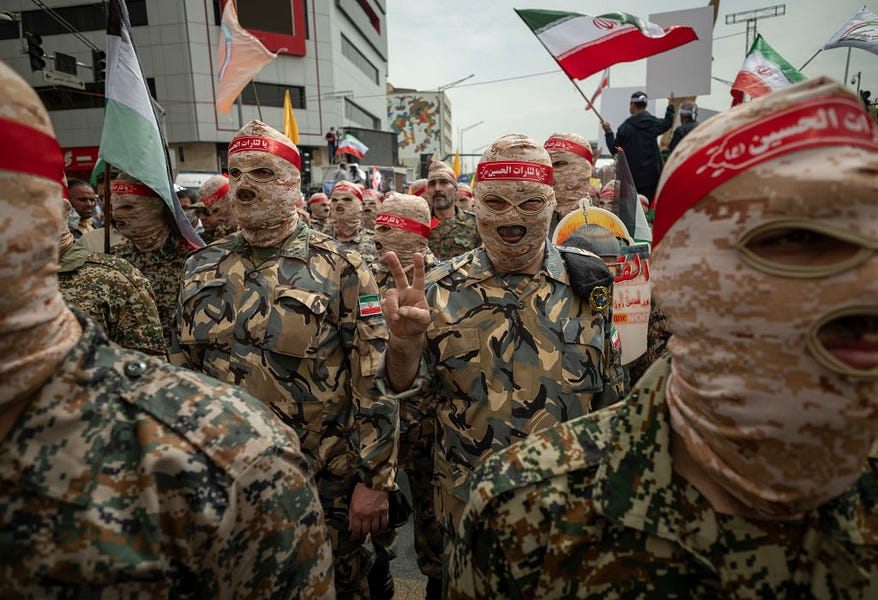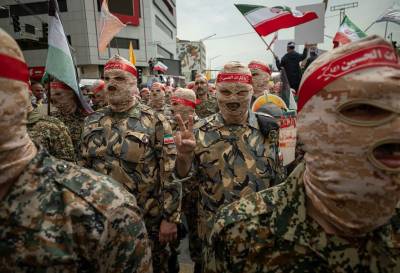After an extended pause, the Biden administration and the Iranian government resumed indirect negotiations in Qatar late last month over a joint return to the 2015 nuclear agreement formally known as the Joint Comprehensive Plan of Action (JCPOA). The talks had reached an impasse due to the Biden administration’s apparent refusal to yield to Tehran’s demand that Washington lift the Islamic Revolutionary Guards Corps’ designation as a foreign terrorist organization (FTO). The Guards, or IRGC, are still very much in the business of terrorism, but Tehran recognizes the administration is ready to pay almost any price for a deal. However, bipartisan resistance in Congress to giving the IRGC a pass stayed Biden’s hand.
One is tempted to give the president credit for finally saying no to the excessive demands of the clerical regime in Tehran in his interview with Israel Channel 12, and for committing publicly to keeping the IRGC on the FTO list. However, there have been disagreements within the administration over this course of action, and his team is likely looking for ways to stick to the letter of Biden's pledge while easing the burden on Iran.
In that regard, there are three principal tactics that Congress should be on the lookout for: lifting sanctions on key entities that fund and facilitate IRGC terrorism, such as the Central Bank of Iran (CBI); issuing what are known as general licenses that carve out yawning gaps in the terrorism sanctions regime; and narrowing the IRGC’s FTO designation or specially designated global terrorist (SDGT) designation so it applies only to a slice of the organization.
A sizable bipartisan majority in the Senate has already signaled its opposition to such potential gambits. Republican Sens. James Lankford of Oklahoma and Ted Cruz of Texas introduced amendments to China-related legislation in May that communicated the upper house’s deep reservations about weakening terror sanctions.
The first measure, passed by a vote of 62-33, called for any agreement the administration makes with Tehran to address “the full range of Iran’s destabilizing activities,” and not remove the terrorism sanctions critical to targeting Iran’s malign conduct. The second measure, passed by a vote of 86-12, stated that terror sanctions on the IRGC as well as the CBI are a necessity. While these measures are non-binding, they place a bipartisan majority of the Senate on record not once but twice opposing potential efforts to weaken the application or enforcement of terrorism sanctions.
The Senate was reacting in part to the administration’s intent to provide Iran with unobstructed access to its oil revenues—past, present, and future—in return for its reentry into the JCPOA. The only way for the administration to keep that promise is to lift sanctions against the CBI as well as the National Iranian Oil Company (NIOC) and National Iranian Tanker Company (NITC).
The U.S. has sanctioned all three for supporting IRGC terrorism, and they will remain key financiers of the IRGC. There is simply no way to give Tehran full access to oil revenues without lifting these sanctions, even though this would give a shot in the arm to the IRGC without revoking its terror designation.
The second measure the administration may take to ease pressure on the IRGC is to issue general licenses—authorizations for doing business with sanctioned entities—in a manner that would eviscerate the effect of terrorism designations. There is a recent precedent for such moves: In December 2021, the Biden administration issued a series of exceedingly broad general licenses for Afghanistan. The licenses included authorization to do business with the Haqqani Network, a close ally of the Taliban and al-Qaeda, which is also a designated FTO.
One such general license was so broad that it authorized “all transactions involving Afghanistan or governing institutions in Afghanistan,” prohibiting only transactions with individual members of the Haqqani Networks. Yet these individuals run large swaths of the Afghan government, so the license effectively allows business to be conducted with institutions controlled by terrorists. The administration could easily follow this example in the case of Iran by granting equally broad licenses.
Finally, the Biden administration has been vague on what precisely constitutes keeping the IRGC on the FTO list. The State Department’s Special Representative for Iran Rob Malley left the door open to modifying the IRGC’s status in a recent hearing when he stated that “we’ve made clear to Iran that if they wanted any concession on something that was unrelated to the JCPOA, like the FTO designation, we needed something reciprocal from them that would address our concerns.”
The administration has reportedly been seeking assurances from Tehran that it will neither seek to assassinate former American officials nor take further actions to destabilize the region. If Iran were to provide such assurances (regardless of whether they intend to keep them) the administration might have the pretext it needs to modify the IRGC’s status. Specifically, it could delist the IRGC but maintain an FTO designation of the IRGC Quds Force (QF), its arm responsible for supporting Hamas, Hezbollah, the Yemeni Houthis, and other terrorist allies.
In advance of a potential IRGC delisting, or substitution of the Quds Force, the administration and others who favor engagement with Tehran have been working to portray FTO designations as redundant or largely symbolic. They made similar arguments when the Trump administration first added the IRGC to the FTO list in 2019.
In the same hearing where Rob Malley testified, Sen. Rand Paul of Kentucky stated that “even if we got rid of the Foreign Terrorist Organization label, the IRGC has been under, as someone mentioned previously, they have been under sanctions at least since 2007 for funding Hezbollah in Lebanon … (s)o there still would be sanctions.”
It is certainly true the U.S. government has applied other terror sanctions to the IRGC. For example, the Quds Force has been a specially designated global terrorist (SDGT) since 2007. Yet the IRGC does not have good parts and bad parts. It is a single integrated organization that reports to Supreme Leader Ali Khamenei. Accordingly, the Quds Force receives its funding and support from the IRGC, which controls entire sectors of Iran’s economy, whole industries, or structurally significant companies, such as NIOC.
Iran wouldn’t care if the administration kept the Quds Force on the FTO and SDGT list given that the Quds Force doesn’t have significant economic assets. But the regime does care about foreign investment and international business, particularly in the energy sector. The SDGT designation of the full IRGC makes it perilous for many banks and companies to go near Iran because of the presence of the IRGC in so many sectors. The FTO designation of the IRGC magnifies this risk by adding its very low trigger for criminal prosecution with wide, extraterritorial reach. This makes it dangerous for international companies and banks to do business with Iran in general because so much of that country’s industries are owned or controlled by the IRGC and any payment to the wrong person could result in criminal prosecution by the U.S.
The IRGC’s FTO and SDGT designations are not symbolic; they have real-world consequences for the Iranian regime, and for any company hoping to invest in or do business with Iran.
Given that the risk that the Biden team could water down terrorism sanctions without technically lifting the IRGC’s formal designation as an FTO, Congress should take immediate action to protect the integrity of sanctions. It can do this by passing legislation restricting the administration’s authority to lift or otherwise weaken terrorism sanctions pending the concrete, verifiable, and irreversible dismantlement of the IRGC’s terrorist infrastructure. Congress should also condition sanctions relief on Tehran’s provision of proper restitution for all American victims of Iranian terrorism, particularly our Gold Star families.
The administration’s proposed terms for a nuclear deal are already so flawed that they would bring Iran far closer to nuclear weapons after just a few years. Adding a terror license to a nuclear capability would be doubly reckless.






Please note that we at The Dispatch hold ourselves, our work, and our commenters to a higher standard than other places on the internet. We welcome comments that foster genuine debate or discussion—including comments critical of us or our work—but responses that include ad hominem attacks on fellow Dispatch members or are intended to stoke fear and anger may be moderated.
With your membership, you only have the ability to comment on The Morning Dispatch articles. Consider upgrading to join the conversation everywhere.